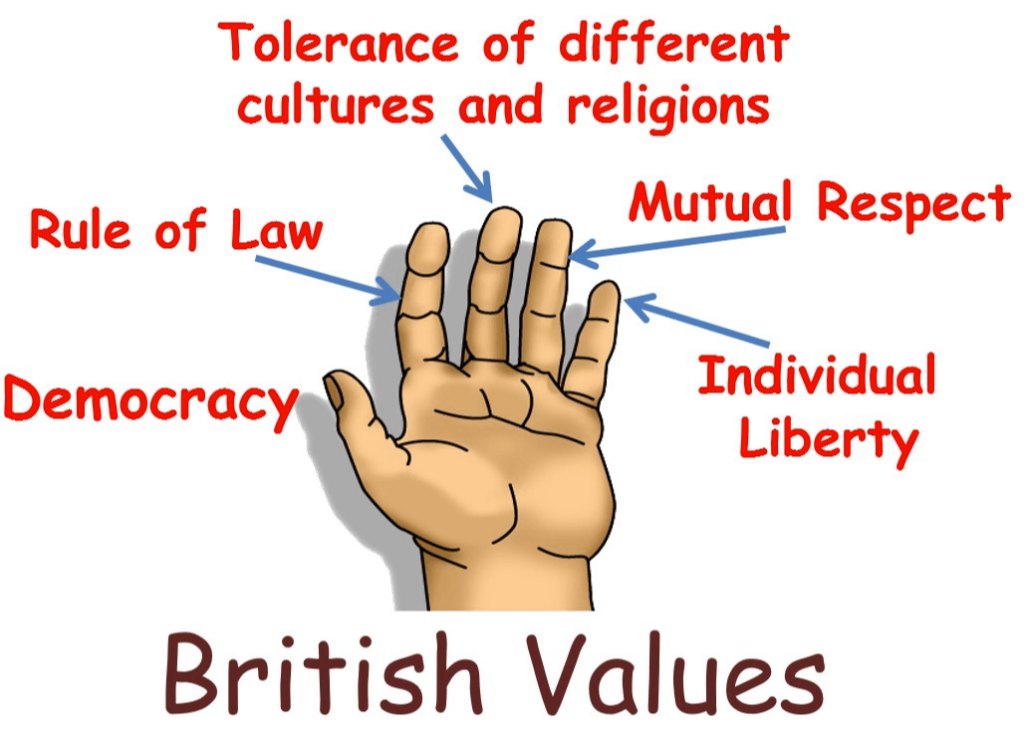Our British Values
At Wyborne Primary and Nursery School, we actively promote the British Values of Mutual Respect, Democracy, Rule of Law, Tolerance and Individual Liberty and Responsibility.
We recognise the diversity within our society and ensure that British Values are embedded within our curriculum.
We promote British Values in many ways throughout the daily life of our school.
Mutual Respect
Pupils work in teams and in different groupings across the curriculum, showing respect for other pupils’ opinions during class discussions, assemblies, sporting events and performance.
School rules reinforce mutual respect and children know that our school motto is ‘Kind, hardworking and welcomes all’. There is a weekly celebration and praise assembly.
All members of the school community treat each other with respect and model this behaviour with colleagues and pupils. Children are encouraged to turn-take, share, negotiate and collaborate.
Children participate in charity events throughout the year.
Democracy
Our Pupil Governors promotes the democratic process – pupils nominate and vote for their representatives. Pupil Governors meet regularly and their ideas and suggestions are listened to and considered carefully.
Our marking policy encourages feedback enabling pupils to respond to and influence the learning process.
Children create and adhere to class rules.
Pupils parents and carers are surveyed regularly and the results of those surveys inform aspects of the School Strategic Vision Plan.
Children are encouraged to voice their opinions in formal and informal ways
Rule of Law
We have clear rules and expectations of behaviour which are adhered to by all pupils, staff and other stakeholders. There is a system of rewards and sanctions across the school which all children understand.
Each class has a class set of rules created by the class teacher and the pupils at the start of each academic year. The children discuss and understand the reasons why these rules are important.
Visits from emergency services such as the police, reinforce the rule of law and the reasoning/purpose behind them and the consequences when laws are broken.
Good attendance and punctuality is encouraged and all children and staff are aware of the importance of being at school.
Pupils follow, respect and understand the need for different rules in different situations, i.e. PE lessons, school visits, classrooms and the playground. In older classes, children contribute towards writing the risk assessments for school visits.
Pupils are awarded weekly Star of the Week certificates in recognition of their learning behaviours.
The school supports pupils in regulating their own behaviour to make choices for the well-being of themselves and other using strategies and restorative approaches which are used throughout school.
Individual Liberty and Responsibility
Children are provided with boundaries which encourage them to make choices safely.
Pupils are encouraged to respectfully express their views and beliefs
Pupils have the opportunity, and are encouraged, to take part in a broad range of extra-curricular activities.
Children develop a sense of personal responsibility by undertaking jobs around the school such as ambassadors, pupil governors, young interpreters and reading buddies.
Pupils are encouraged to know, understand and exercise their rights and personal freedoms and advised how to exercise these safely, for example, through our PHSE and E-Safety lessons.
Children learn about the world of work through careers week, visits and visitors and are taught how to manage their money in PHSE lessons.
Pupils know who to speak to if they are worried or concerned about themselves or others, e.g. Learning Mentors, teachers and teaching assistants
Children are taught how to look after the environment
Tolerance
Our curriculum provides children with a broad and balanced understanding of world religions and promotes respect for the beliefs of others.
Children are taught to challenge gender, race and cultural discrimination through PHSE and the wider curriculum.
Children learn about prejudice through the stories of famous people such and events in history.
We provide resources to ensure that all pupils are effectively integrated into the teaching and learning process and the wider school community, including those that join at different starting points and those who have English as an additional language.
Children are taught from a young age that families can look different from one home to the next.
Children visit places of worship that are important to different faiths.

